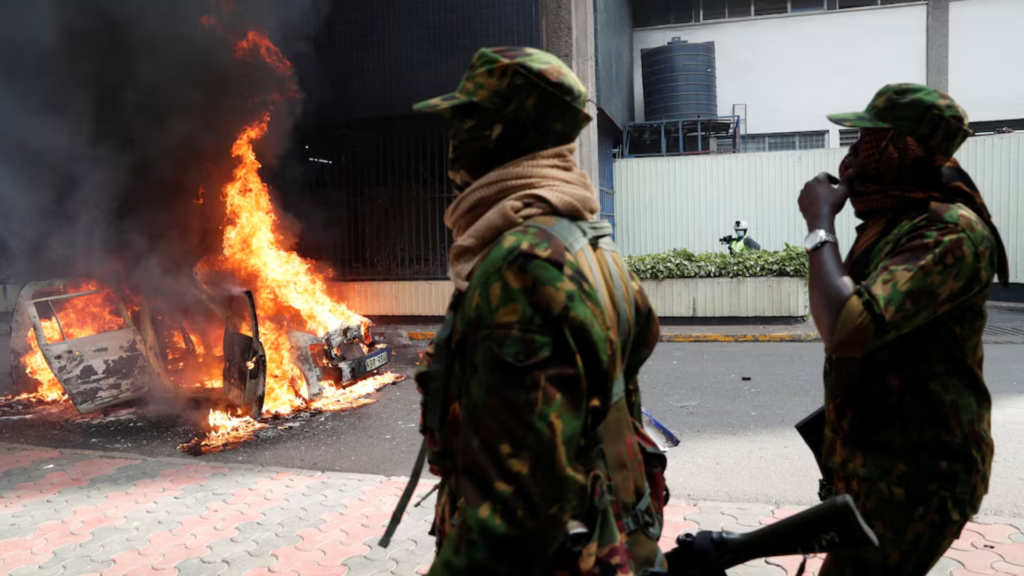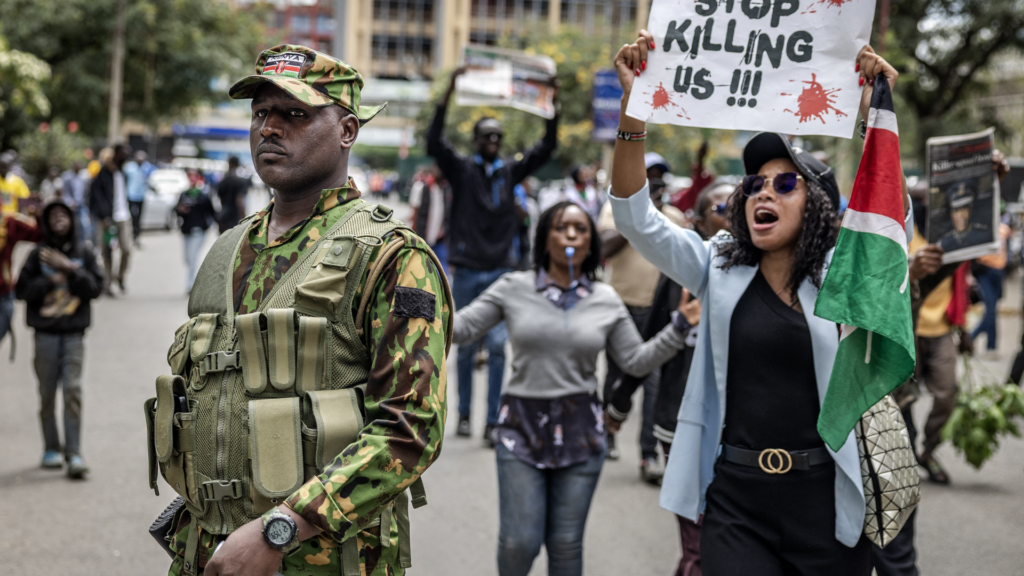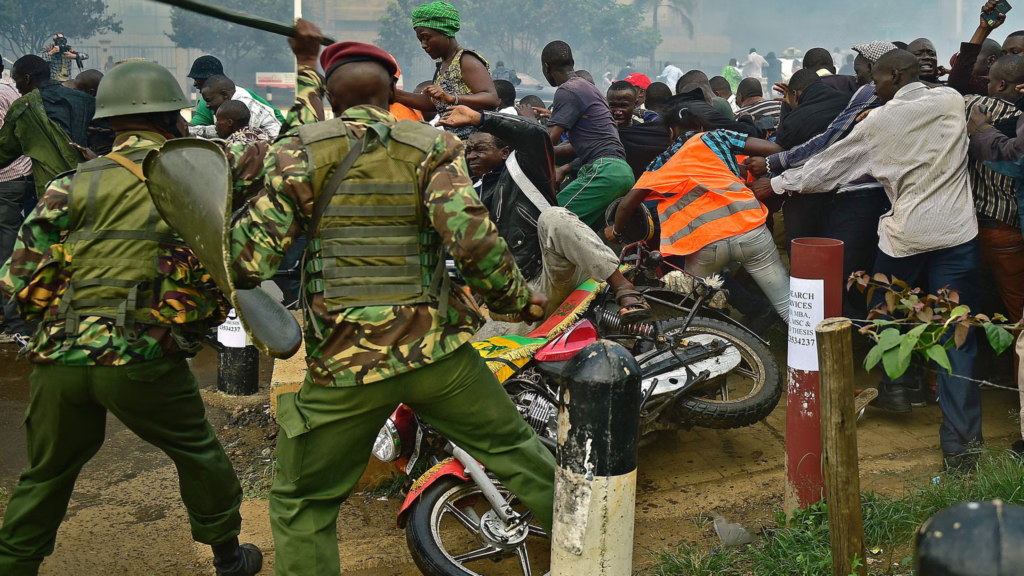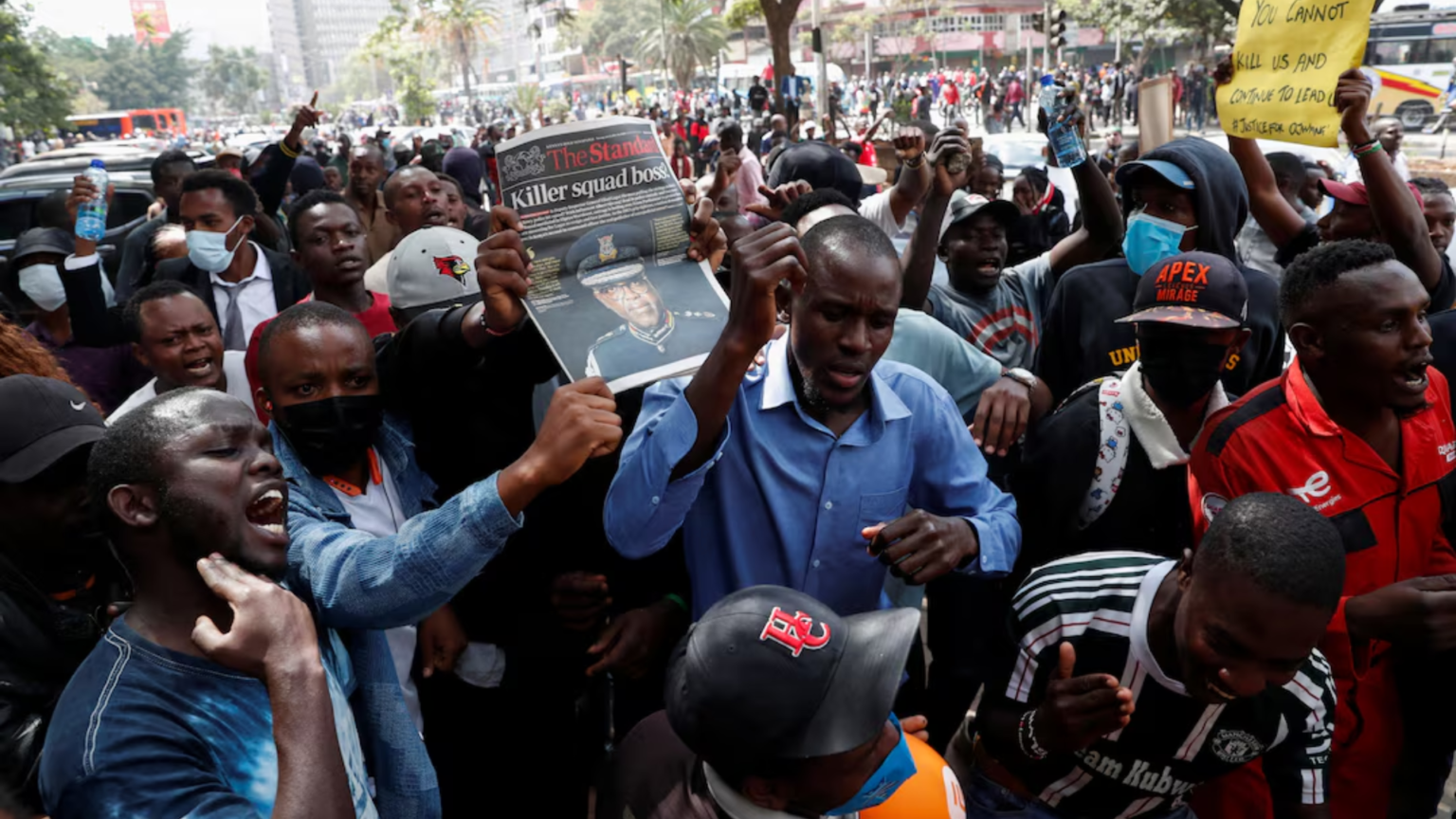Kenyan Police Officer Arrested in High-Profile Custody Death Case
A Kenyan police officer has been arrested following the death of Albert Ojwang, a 31-year-old man who died in police custody. Ojwang had been arrested after criticizing a senior officer online. The arrest has sparked public outrage and protests in Nairobi. It has also reignited national scrutiny over police brutality and accountability in Kenya.

Authorities initially claimed that Ojwang’s death was self-inflicted. However, a government pathologist later found that the injuries were “unlikely to be self-inflicted.” In response, President William Ruto promised a full investigation. He also reassured citizens that rogue police behavior would not be tolerated.
Background: Circumstances Behind the Kenyan Police Officer’s Arrest
Albert Ojwang was arrested over the weekend after he posted a series of critical comments on social media targeting Deputy Inspector General Eliud Kipkoech Lagat. Shortly after his arrest, police claimed Ojwang had fatally injured himself by repeatedly hitting his head against a cell wall.

However, a post-mortem conducted by a government-appointed pathologist cast serious doubt on that explanation. The examination revealed trauma inconsistent with self-inflicted injuries, prompting Kenya’s Independent Policing Oversight Authority (IPOA) to open a formal probe.
Public Outrage Grows After Kenyan Police Officer Arrested
The death of Ojwang has sparked protests across the capital. Demonstrators are calling for justice and the resignation of the deputy inspector general named in Ojwang’s online posts. Crowds gathered outside police stations and government offices. Many carried signs reading “Justice for Albert” and “End Police Brutality in Kenya.”
The case has become a symbol of deeper problems within the Kenyan police force. Human rights groups and activists have long accused officers of using excessive force. They also report frequent extrajudicial killings and a lack of accountability.
Government and Police Response to Kenyan Police Officer Arrest
On Friday, Kenya’s police spokesperson Michael Muchiri confirmed that a Kenyan police officer had been arrested in connection with the death of Albert Ojwang. He declined to offer further details and referred reporters to the IPOA.

Earlier in the week, Muchiri announced that five police officers had been removed from active duty “to allow for transparent investigations.” The officers were reportedly part of the unit responsible for detaining Ojwang.
Kenya’s President William Ruto responded to the public pressure by urging swift action. Speaking at a press briefing, he said, “The government will protect its citizens from rogue police officers. No one is above the law.”
IPOA Investigation Highlights Following Kenyan Police Officer Arrest
The Independent Policing Oversight Authority has taken charge of the case. Though the IPOA has not released detailed findings yet, it confirmed that at least 20 people have died in custody in the last four months alone.
This alarming statistic underscores the urgency for reform. Many civil society organizations argue that the existing oversight mechanisms are insufficient and that officers accused of misconduct rarely face real consequences.
Human Rights Groups React to Kenyan Police Officer Arrest and Custody Deaths
The arrest of the Kenyan police officer has drawn attention from international human rights bodies. Amnesty International Kenya released a statement demanding the Kenyan government commit to “systemic reform” of law enforcement agencies.
Locally, groups such as the Kenya Human Rights Commission (KHRC) have intensified calls for independent reviews of police conduct. “This is not an isolated case,” said a KHRC spokesperson. “We must address the broader pattern of impunity that allows these abuses to continue.”
Patterns of Abuse: A Recurring Issue in Kenyan Law Enforcement
This is not the first time Kenyan police have come under fire. From the post-election violence in 2007-2008 to recent crackdowns on protests, the police have often been accused of excessive force, torture, and even extrajudicial killings.

The IPOA was created in 2011 to serve as a watchdog, but critics argue that it lacks the resources and independence necessary to hold powerful officers accountable. Transparency remains a major hurdle, especially when suspects are fellow officers.
Ojwang’s Case as a Catalyst for Reform
Albert Ojwang’s tragic death may become a turning point in Kenya’s approach to policing. The nationwide protests have shown that public tolerance for police abuses is rapidly diminishing. There is growing consensus that Kenya must urgently implement the National Police Service reforms proposed years ago.
These reforms include the establishment of independent civilian review boards, mandatory use of body cameras, and the restructuring of internal affairs units within the police force.
Calls for Deputy Inspector General Eliud Kipkoech Lagat to Step Down
Protesters and opposition leaders have directly called for the resignation of Eliud Kipkoech Lagat, the deputy inspector general allegedly targeted by Ojwang’s social media posts. While Lagat has not commented publicly, political pressure is mounting.
Some lawmakers are proposing a parliamentary inquiry into his conduct, citing a need to restore public faith in the integrity of the National Police Service.
Next Steps in the Investigation and Legal Process
The arrested Kenyan police officer will likely be arraigned in court in the coming days, pending further investigation. The IPOA is expected to deliver its preliminary findings within two weeks.
Legal experts anticipate that the case may be transferred to Kenya’s High Court if evidence supports a charge of manslaughter or murder.
Conclusion: A Defining Moment for Police Accountability in Kenya
The arrest of a Kenyan police officer over the death of Albert Ojwang marks a pivotal moment in the ongoing fight against police brutality in Kenya. While justice for Ojwang is not yet guaranteed, public outrage has galvanized demand for deeper institutional change.
As the IPOA continues its investigation, and international scrutiny intensifies, the Kenyan government faces a critical decision: implement real reform or risk further eroding public trust in law enforcement.




